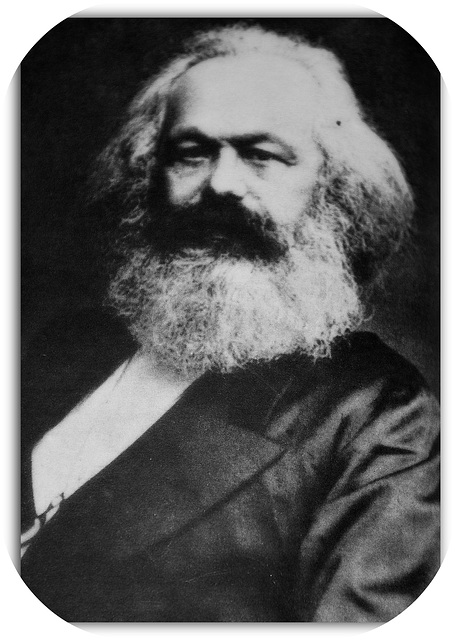Thomas Hobbes 1588-1679
Arthur Schopenhauer
Words
Future of PC
Ouch! ... It's cold
Grass
Grass
Downtown
Chrysler
Ford
Chevrolet
Brush
.............? 1930
Ford Victoria 1951
Lincoln 1962
Chevy Impala 1958
Studebaker 1960
Ubiquitous
June 13th 2008
"The Mystery of Consciousness"
Eratosthenes' Geodesy
J.Krishnamurthi & physicist David Bohm ~ 1984
Bring me the sunset in a cup
One evening
Twilight
Autumn Moon
"A Premier of the Daily Round"
One leaf on a branch
Walking alone In Dead of Winter
The Lane
January morning
Snowy woods
On ice
A Cardinal
No answer came
High places
Dreams in the dusk
Keywords
Authorizations, license
-
Visible by: Everyone -
All rights reserved
-
217 visits
Karl Marx


Radical social theorist and organizer of the working class, whose thought is widely regarded as the chief inspiration for all forms of modern social radicalism. Born 5 May 1818 in the Rhenish city of Trier, Karl Heinrich Marx was a son of successful Jewish lawyer of conservative political views who converted to Christianity in 1824. He studied law at the University of Bonn in 1835 and at the University of Berlin in 1836, changing his course of study in that year to philosophy, under the influence of Ludwig Feuerbach, Bruno Bauer, and the Young Hegelian movement. Marx completed his doctorate in philosophy in 1841.
- Keyboard shortcuts:
Jump to top
RSS feed- Latest comments - Subscribe to the comment feeds of this photo
- ipernity © 2007-2024
- Help & Contact
|
Club news
|
About ipernity
|
History |
ipernity Club & Prices |
Guide of good conduct
Donate | Group guidelines | Privacy policy | Terms of use | Statutes | In memoria -
Facebook
Twitter

……………………..The social relationships depicted by political economy, however, are relationships in which the life-activity of the majority, the working class, is increasingly stunted, reduced to meaningless physical activity which, far from developing and exercising their humanity, reduces them to abstract organs of a lifeless mechanism. They do not experience the products of their labour as their expression, or indeed as theirs in any sense. For these products belong to the non-worker, the capitalist, to whom they must sell their activity for a wage which suffices only to keep them alive so that they may sustain the whole absurd cycle of their lives. Political economy, moreover, depicts human beings whose social life and relationships are at the mercy not of their collective choice but of an alien, inhuman mechanism, the marketplace, which purports to be a sphere of individual freedom, but is in fact a sphere of collective slavery to inhuman and destructive forces ~ page # 168 & 170
………………………What both Hegel and Feuerbach had in common is the perception of alienation as fundamentally a form of false consciousness consists in its negative attitude toward earthly life, the comforting assurance of religion, according to both philosophers, contain the truth, if only we know how to put the right philosophical interpretation of them. To Marx, however, alienation becomes intelligible as soon as we adopt just the reverse supposition: that the alienated consciousness tells the truth in its laments, not in its consolations. Religion, according to Marx, gives expression to a mode of life which is really empty, unfulfilled, degraded, devoid of dignity. Religious illusions have hold on us because they provide a false semblance of meaning and fulfillment for a mode of life which without this illusion would be misery is both an expression of actual misery and an attempt to flee from it into a world of imagination: it is the ‘opium of the people’. The way out of alienation is not, as Hegel and Feuerbach though, a new philosophical interpretation of life, but a new form of earthly existence, a new society in which the material conditions for fulfilling human life would no longer be lacking. “The philosophers have only interpreted the world in different ways; the point is to change it” ~ page # 170
For Marx the ultimate tendency of history is the Promethean drive of the human species to develop its ‘essential human powers’, its powers of production. Under capitalism these powers, and complex network of human co-operation through which they are exercised, have for the first time grown far enough to put within the reach of human beings themselves the collective, rational control of the social form of their own production. This self-conscious self-determination is the true meaning of human freedom. But human beings under capitalism are alienated because capitalist social relations, by dispossessing the vast majority producers and subjecting the form of social production to the market mechanism, frustrate this collective self-determination. The historic mission of the proletariat is to actualize the capacities for human freedom which the capitalist mode of production has put within our reach, but abolishing class society. In this way, historical materialism gives the working class a full conscious understanding of its historic mission, so that unlike previous ruling classes it may fulfil this mission consciously, and thus truly enable the human species to master itself and its destiny . ~ page # 171
Excerpts: “The Philosophers” (Oxford University Press)
Sign-in to write a comment.